 Leo Goldsmith
Leo Goldsmith
The abjection of my affection: Joaquin Phoenix plays a reclusive mama’s boy in Ari Aster’s latest.
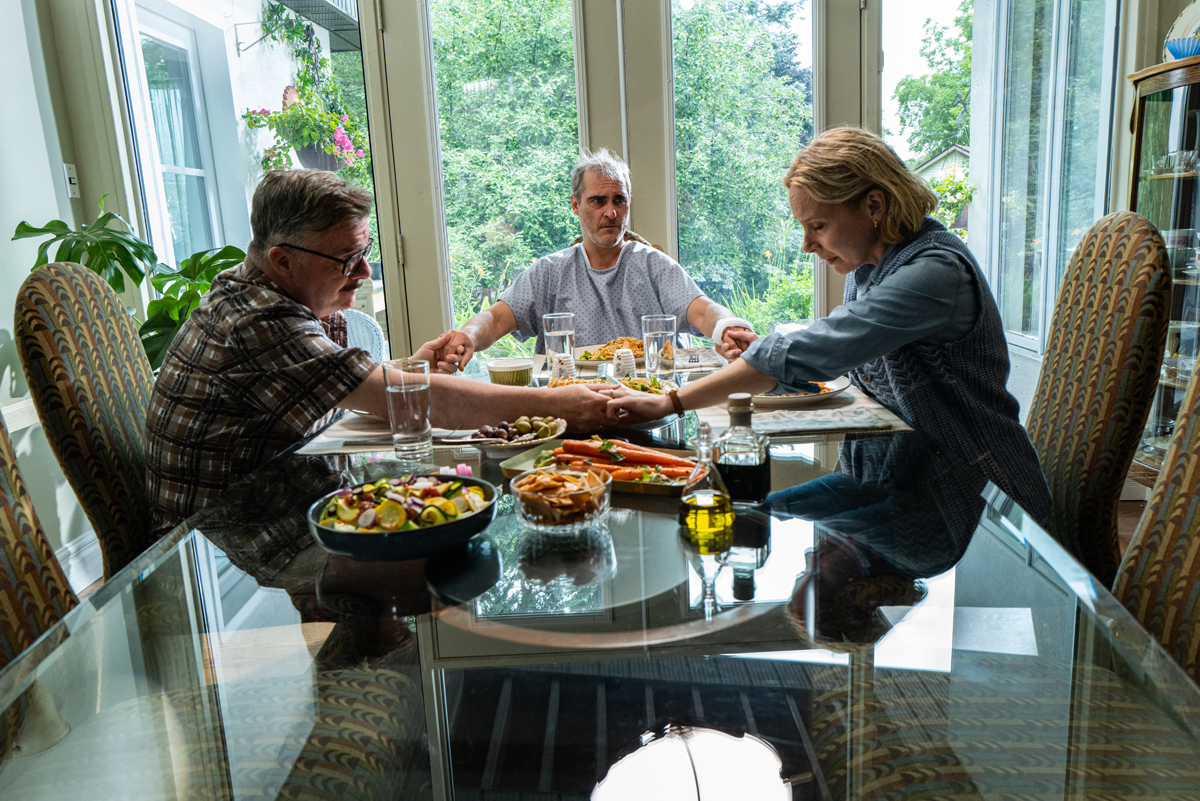
Nathan Lane as Roger, Joaquin Phoenix as Beau Wassermann, and Amy Ryan as Grace in Beau Is Afraid. Courtesy A24. Photo: Takashi Seida.
Beau Is Afraid, written and directed by Ari Aster, now playing in theaters
• • •
What does cinema smell like? Light one of ten scented candles available on the website of the film studio A24 and find out. Documentaries carry the odor of lotus, lavender, vinegar, and oakmoss; musicals exude the aroma of fig leaf, pink pepper, and lily of the valley; and science fiction emits hints of water lily, wild mint, and ice water. Each is available for forty-eight dollars, alongside an array of items including latex gloves in the shape of the hot-dog fingers from Everything Everywhere All at Once, The Whale soundtrack on vinyl, and socks, beach towels, and ball-caps emblazoned with the company logo.
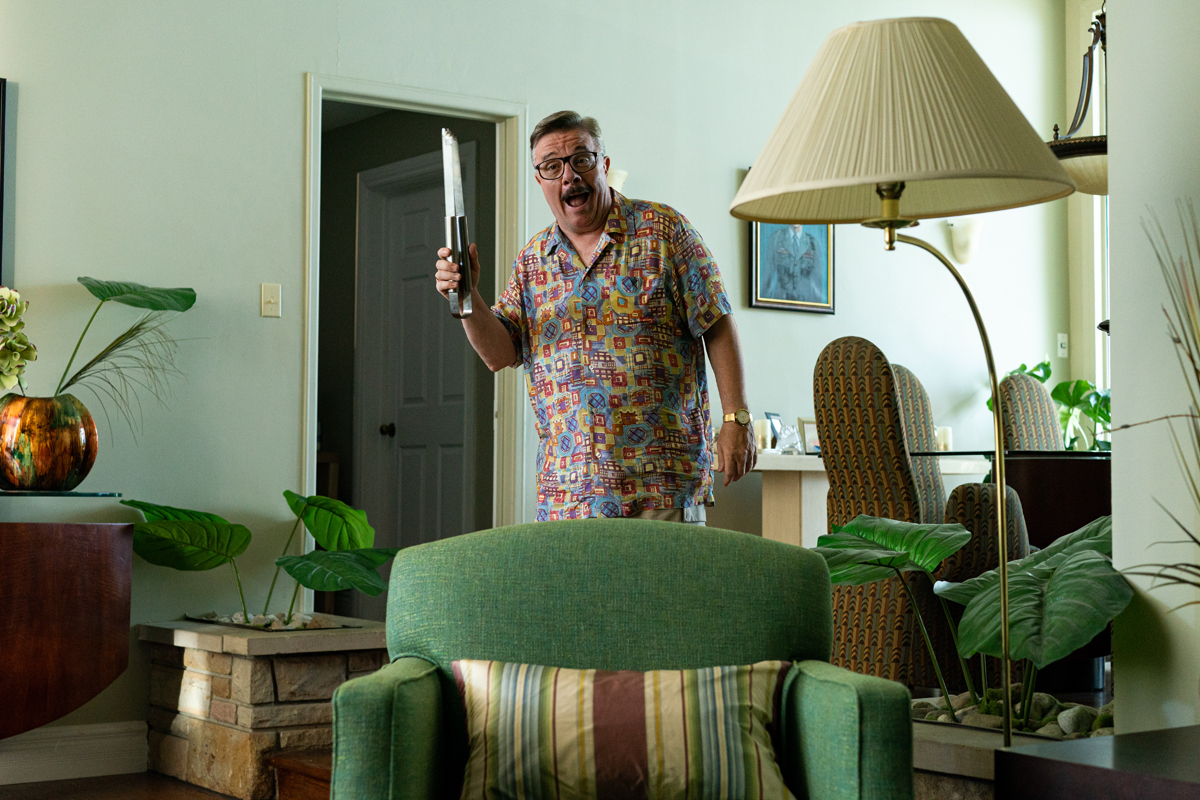
Nathan Lane as Roger in Beau Is Afraid. Courtesy A24. Photo: Takashi Seida.
A24 also makes movies, but, as one of contemporary cinema’s most recognizable brands, it often looks as much like a design firm as a film studio. Since the release of its first features a decade ago—including Harmony Korine’s Spring Breakers (2013), something of a mood board for A24 aesthetics—the company has built a loose but distinctive style relying on glossy palettes, “disruptive” takes on popular film genres, and souped-up sound design. It’s also enlisted the type of auteurs often described on movie posters as “visionary”—David Lowery, Robert Eggers, the Safdie brothers, and Ari Aster. The A24 brand is not exactly hegemonic—it’s unclear to me whether working under the studio’s aegis has zhuzhed up Joanna Hogg’s or Kelly Reichardt’s style—but it nonetheless coheres into an aura of quality that has attracted a fanbase all its own, one typically associated with a certain kind of “film bro” (some of whom are women). This makes for good movies and bad, but at the very least A24 has helped to fill the often vacant tier of upper-middle-budget filmmaking in an industry besotted with franchising and recycled IP. And it has achieved this by exploiting that most precious of twenty-first-century resources—not smell, but vibes. As Barry Jenkins stated of the studio in 2017: “They don’t need to know what [your project is] about. They just need to know how it feels.”
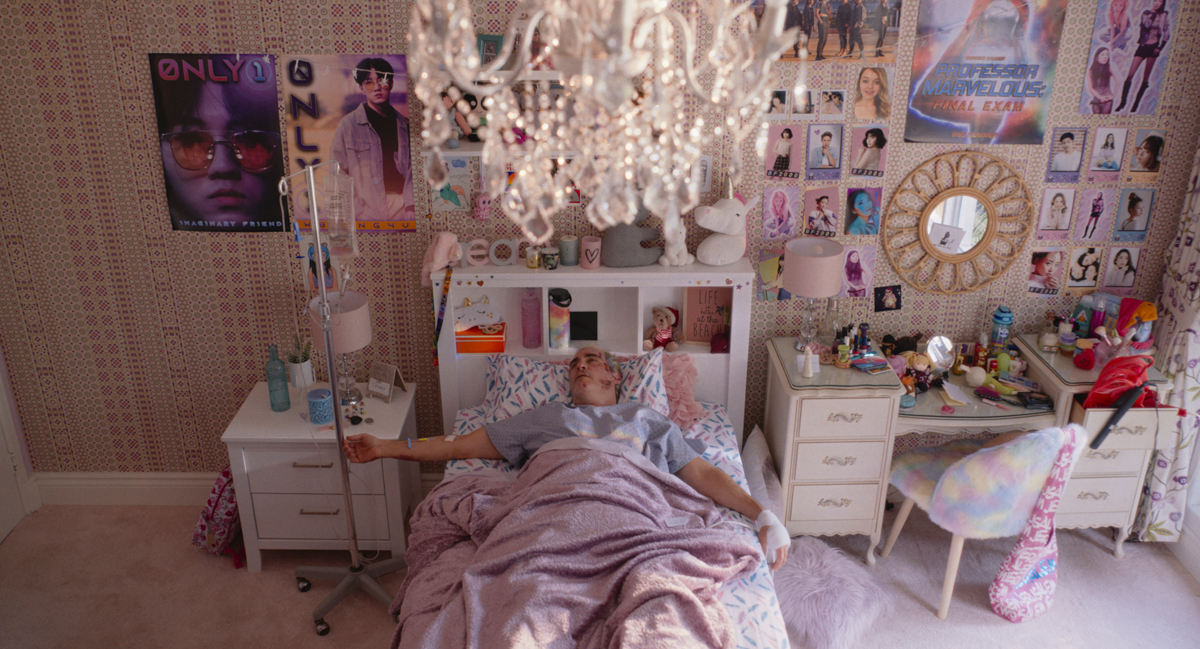
Joaquin Phoenix as Beau Wassermann in Beau Is Afraid. Courtesy A24. Photo: Takashi Seida.
The full line of merchandising tie-ins for Ari Aster’s Beau Is Afraid has yet to be announced, but one imagines its scented candle would be rather fetid, with notes of vomit and anxiety-induced body odor. Like the director’s previous two features—Hereditary (2018) and its successful follow-up, Midsommar (2019)—Beau is a horror movie of the “elevated” variety, but one that instrumentalizes a terror of humanity rather than the supernatural or the occult. Relentless and distended—the film is a minute shy of three hours—it is avowedly unlikable. But with its persnickety set and sound design, and airlessly fastidious cinematography (by Aster’s longtime collaborator Pawel Pogorzelski), it nonetheless neatly fits the A24 vibe.
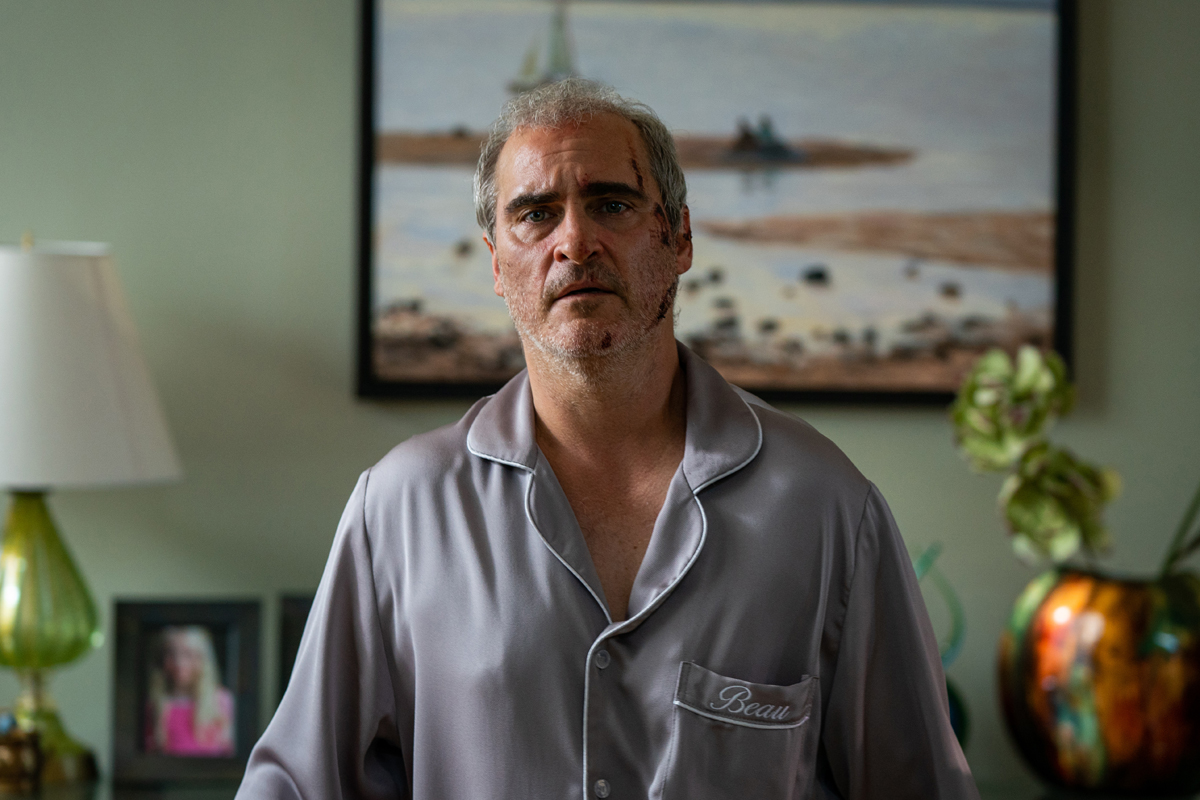
Joaquin Phoenix as Beau Wassermann in Beau Is Afraid. Courtesy A24. Photo: Takashi Seida.
The Beau of the title is a hapless, volcel recluse, played by Joaquin Phoenix—once again physically transformed, this time into a zaftig figure who, with his doughy frame, multiple chins, and male-pattern baldness, resembles nothing so much as a middle-aged baby. We know little about him, other than the fact that he apparently has no friends or job, and appears to rely—emotionally and perhaps financially—on his wealthy, domineering mother, Mona (Patti LuPone). What he is afraid of, we learn, is everything: poor people, rich people, taking medication, not taking medication. When we meet Beau, he is embarking on a journey home to visit Mom, but these plans are immediately thwarted by the human race and its unstinting cruelty: a thief in Beau’s building who steals his keys and his luggage, an unsympathetic convenience store clerk, and a hoard of violent crust-punks and indigents who menace Beau in the streets and invade his apartment.

Armen Nahapetian as Teen Beau and Zoe Lister-Jones as Young Mona in Beau Is Afraid. Courtesy A24. Photo: Takashi Seida.
Setting the film’s clamorous tone, this first episode—which is based on a goofy but economical 2011 short Aster made soon after graduating from the AFI Conservatory—is enervating, but is by far the film’s most engaging chapter. What follows is a litany of random, mostly unfunny, and invariably abject encounters, most of which confirm for Beau that all humans—the unhoused, teenagers, middle-class homeowners, women, PTSD-afflicted veterans—are malevolent, overprescribed, and out to get him. All of this is filtered through Aster’s fussy aesthetic program, with its rigidly stylized sequence shots, perpetually ratcheting anxiety, and general aversion to narrative efficiency.
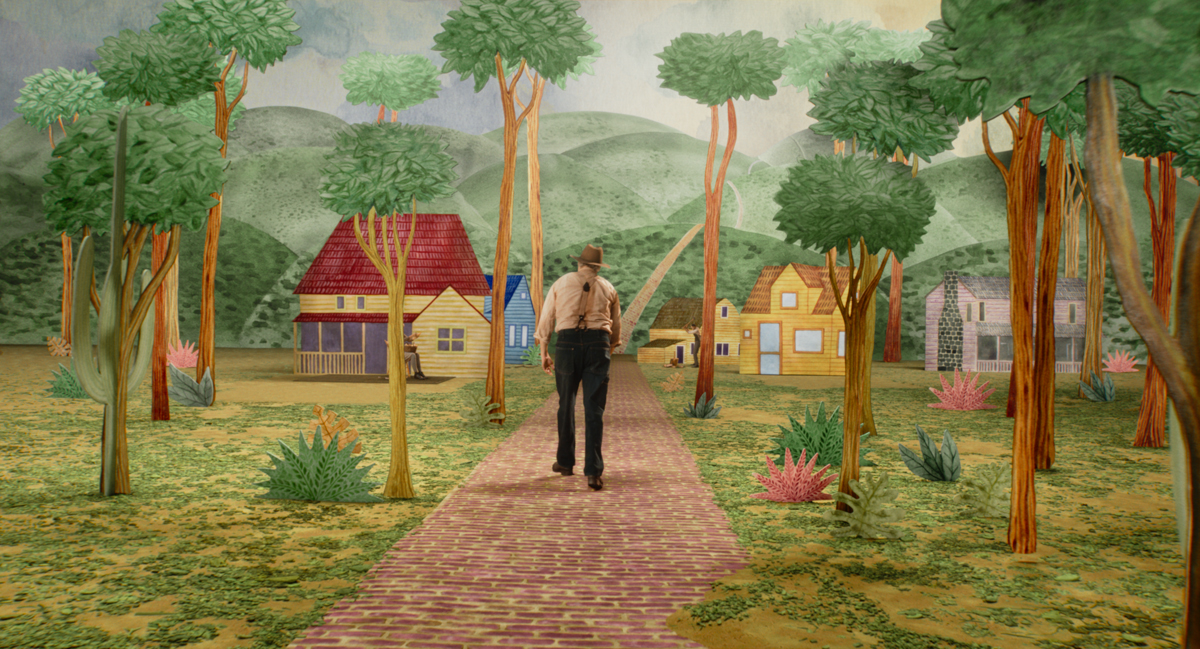
Joaquin Phoenix as Beau Wassermann in Beau Is Afraid. Courtesy A24. Photo: Takashi Seida.
For all of its annoyances, Aster’s approach would be more distinctive, if not exactly “visionary,” were it not so familiar. Since the very first moments of Hereditary, Aster has demonstrated repeatedly his fascination with dollhouses and miniatures, a fancy that has always struck me as that of a more workaday Wes Anderson, minus the corduroy suits. At its precise midpoint, Beau Is Afraid courts surrealism when our hero encounters a theater troupe in the woods—something like the Bread and Puppet Theater by way of the Max Fischer Players—who mesmerize him with their performance. This scene, which begins as a welcome breather in an otherwise exhausting film, soon morphs into a semi-Andersonian animated interlude, another odyssey within an already interminable odyssey, courtesy of Chilean filmmakers Joaquín Cociña and Cristóbal León. Elsewhere, Aster’s references are just as obvious: the entire first episode plays like a more aggro retread of Eraserhead (complete with noisily defective elevator), and the film’s denouement, with its atmosphere of hypermediated surveillance and cosmic judgment, is directly cribbed from Albert Brooks’s Defending Your Life.
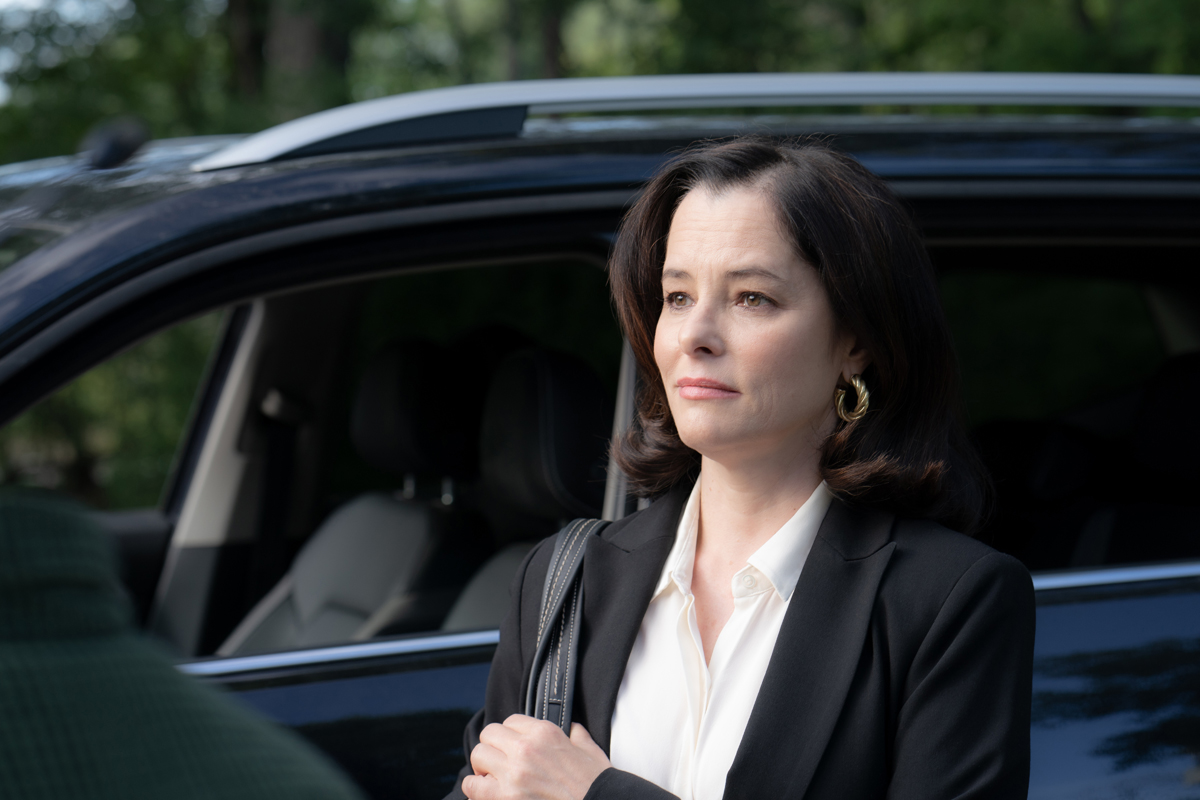
Parker Posey as Elaine Bray in Beau Is Afraid. Courtesy A24. Photo: Takashi Seida.
Even Beau’s character portraits—usually a strength in Aster’s work—seem, despite the tumescent running time, strangely underdeveloped, even caricatural. Phoenix’s fully immersed performances work best in films—like his two collaborations with Paul Thomas Anderson—that allow his genuine eccentricities to seep out. His wildness here is reduced to a series of repetitive tics and nonsensical chunnering, and by the end his affect is permanently frozen into a slack-jawed, saucer-eyed mask of trauma. The stunt-casting of Broadway legend LuPone as Mona and Nathan Lane as an insidiously congenial, pill-pushing doctor makes for slim consolation in a film that criminally underuses both Parker Posey as the woman whom Beau has been saving his virginity for and Richard Kind, who plays Mona’s attorney and whom, in one of the film’s more sadistic gestures, we must wait almost the full three hours to rest our weary eyes upon.
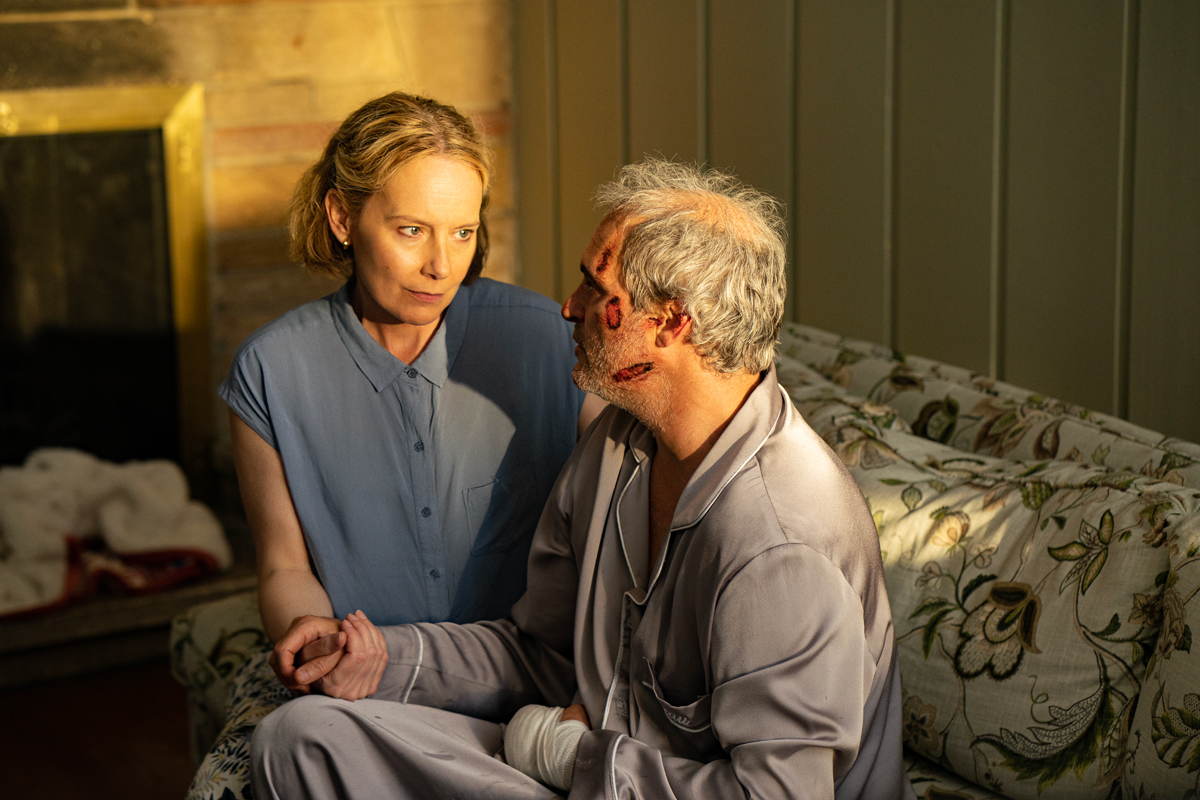
Amy Ryan as Grace and Joaquin Phoenix as Beau Wassermann in Beau Is Afraid. Courtesy A24. Photo: Takashi Seida.
As an expansion of Aster’s short of twelve years ago, the feature-length-and-more Beau Is Afraid enters a world that already has an adequate number of trauma plots about inert adult men who feel alternately menaced and mommied by all they encounter. As such, it’s a surprisingly uninspired effort for a director whose prior work was strongest when it explored the nuances of interpersonal toxicity (in Hereditary, mommy issues again; in Midsommar, ritual savagery among graduate students). No doubt there will be some, either among Aster’s fans or A24’s, who find insight in its running testicle gag, its skepticism about psychotherapy, its hatred of humanity. Some will relish the film’s bludgeoning pace as a series of comic trials and expend inordinate hours on social media enumerating the many Easter eggs as so many auteurist flourishes. It turns out that A24’s approach to filmmaking and marketing, its calculated synergy with a vociferous, extremely online fanbase, doesn’t so much disrupt that of Marvel and Star Wars as resemble it. It’s a man-baby’s world, after all, and the rest of us just have to live in it.
Leo Goldsmith is a writer, teacher, and curator based in Brooklyn.